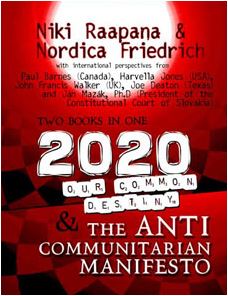Niki Raapana is an independent researcher, co-founder of the Anti Communitarian League (ACL) with Nordica Friedrich, co- author of2020: Our Common Destiny and co-author of the Anti Communitarian Manifesto.
Zionist Communitarian control of the anti-Agenda 21 movement
by Niki Raapana APRIL 17, 2013
In 2000, we identified Communitarianism as the legal system supporting Agenda 21. We identified the "guru" of the Communitarian Network, whose own writings tell us he was a terrorist, a soldier and now a planner in the Zionist takeover of British Palestine. I quickly understood why some Christians would never consider these facts, but I've been trying to understand why so many of the Americans actively opposing Agenda 21 and claiming to be on our "side" avoided discussing Communitarianism and its root philosophy, Zionism, for 13 years. READ MORE
In 2000, we identified Communitarianism as the legal system supporting Agenda 21. We identified the "guru" of the Communitarian Network, whose own writings tell us he was a terrorist, a soldier and now a planner in the Zionist takeover of British Palestine. I quickly understood why some Christians would never consider these facts, but I've been trying to understand why so many of the Americans actively opposing Agenda 21 and claiming to be on our "side" avoided discussing Communitarianism and its root philosophy, Zionism, for 13 years. READ MORE

2020: Our Common Destiny & The Anti Communitarian Manifesto (ISBN-13: 978-0-9814519-2-3) explores the history, philosophy, and modern-day implementation of Sustainable Development, Communitarian Law, and Community Policing.
Part-autobiography, part-thesis, and part-guidebook to International Law, this 327-page book introduces Community Law with a mix of personal experiences, field research, and direct quotes from American presidents and international heads of state, domestic and foreign courts, officials, ecclesiastics, gurus, agencies, think tanks, universities and law schools, foundations, conferences, scientific reports, newspapers, and academic journals.
The Roosevelt Neighborhood Plan (Washington) and The Anchorage 2020/Anchorage Bowl Comprehensive Plan (Alaska) are highlighted to show how Local Agenda 21 plans balance individuals, laws, and economic growth. Readers are challenged to consider some of the little-known aspects of Community Economic Development, like mapping and mobilizing human assets, data-mining, innovative militarized policing, mandates for service, global citizenship, the Hegelian Dialectic, and the ancient spiritual foundation for a worldwide, corporate, quasi-religious legal framework.
Niki Raapana and Nordica Friedrich began publishing in 2000, after they were used as uninformed Human Subjects Research in Seattle, Washington. Their original analysis of Communitarianism reaches an international audience; their work has been referenced and reproduced in books, websites, articles, curriculums and academic papers, including the National Association of Scholars Bibliography of the Communitarian Residence Life Movement.
Part-autobiography, part-thesis, and part-guidebook to International Law, this 327-page book introduces Community Law with a mix of personal experiences, field research, and direct quotes from American presidents and international heads of state, domestic and foreign courts, officials, ecclesiastics, gurus, agencies, think tanks, universities and law schools, foundations, conferences, scientific reports, newspapers, and academic journals.
The Roosevelt Neighborhood Plan (Washington) and The Anchorage 2020/Anchorage Bowl Comprehensive Plan (Alaska) are highlighted to show how Local Agenda 21 plans balance individuals, laws, and economic growth. Readers are challenged to consider some of the little-known aspects of Community Economic Development, like mapping and mobilizing human assets, data-mining, innovative militarized policing, mandates for service, global citizenship, the Hegelian Dialectic, and the ancient spiritual foundation for a worldwide, corporate, quasi-religious legal framework.
Niki Raapana and Nordica Friedrich began publishing in 2000, after they were used as uninformed Human Subjects Research in Seattle, Washington. Their original analysis of Communitarianism reaches an international audience; their work has been referenced and reproduced in books, websites, articles, curriculums and academic papers, including the National Association of Scholars Bibliography of the Communitarian Residence Life Movement.
